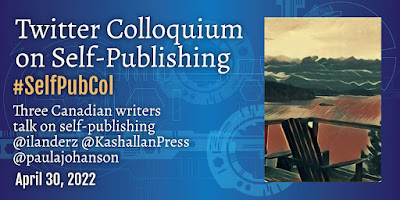I called some writing colleagues to join me for a colloquium -- a small, informal presentation of our recent thoughts on self-publishing. Joe Mahoney joined me, as did Celu Amberstone. We've each sent a thread of tweets on Twitter on this topic, and we'll be conversing over April 30 and May 1.
There are probably nearly as many reasons for self-publishing as there are people doing it. There are a couple of reasons that I have a self-publishing project going in Doublejoy Books. One reason is that with the closing of some publishers, the rights for some of my earlier books have returned to me. I'd like to keep those titles in print, so I've released new editions of them through Doublejoy Books.
Another reason I self-publish is because the technology of publishing and distribution is no longer hard to access. Publishing technology has been nearly affordable since the invention of the mimeograph and similar ink/stencil copiers. Sure, you can make newsletters and fanzines with a Gestetner spirit duplicator or a hectograph, and posters with a good silkscreen. And I've done so, for years.
But books? and books that anyone could access through a bookstore or library, as well as order online? That was hard to do on a small scale, and cost enough in time and money and knowledge that few people could do it. Working on that small scale taught me the meaning of the word "affordable" by my standard. "Affordable publishing" to me means "comparable to the cost of a meal." How much does a book cost to publish -- to lay it out, print it or prepare it as an ebook? Do I have the necessary money? Can I spend the time? Can I learn how? Who will help me, for love or money?
It's easier to ask "How much does a book cost a customer to buy?" There are formulas for recovering expenses of production and distribution, to calculate the sale price of a book. But Cory Doctorow and other writers have taught me that when possible, many books could be given, simply given to readers. Giving books for review makes good sense even to big publishing companies. But giving some ebooks directly to readers makes sense to Cory, and during his career he's made each of his new books available for free to readers. As he says, most people who don't buy my books never heard of me. For Cory, and his publisher, the project has paid off. He's kept track, and for every two downloads of a book, there is usually a letter or email of thanks and a customer who purchased one or two copies. Any writer would like those numbers!
It works so well for Cory because of marketing. Technology of publishing has become more accessible for small press and independent publishers. A person can use computers at a public library, and an online publishing platform, and it will cost less in dollars than the price of a meal to make ebooks, audiobooks, and print books available wherever books are sold. But marketing helps people know what is available, and marketing takes many things: time, skill, money and more.


Comments
Post a Comment